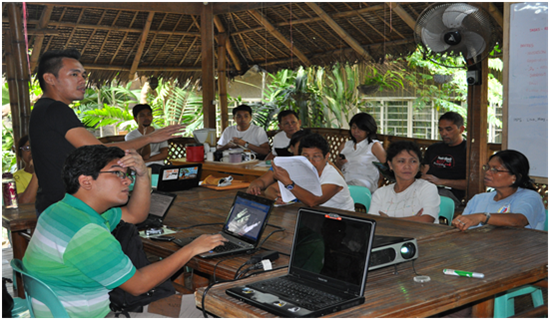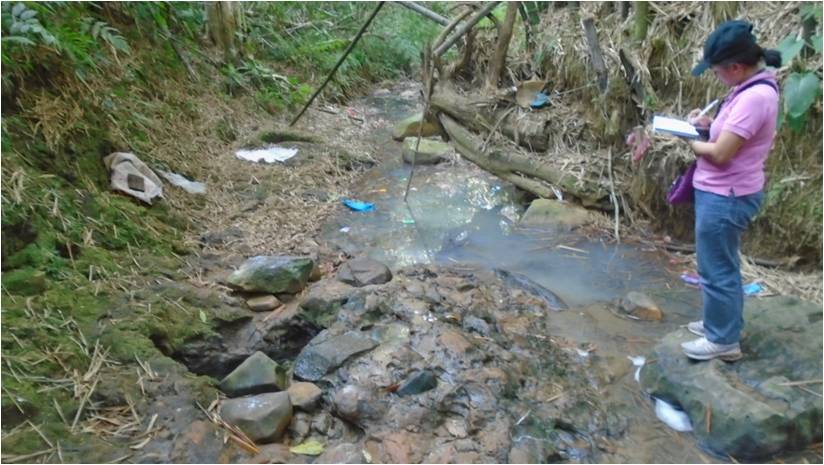Preliminary assessment of the environmental impacts of a large-scale industrial pineapple plantation and processing facility in Manolo Fortich, Bukidnon, Philippines.
 |
AGHAM- Advocates of Science and Technology for the People | |
 |
Cosico, Maria Finesa | |
 |
http://agham.com | |
 |
JPY 400,000 |
Research Background Final Report (abstract) Others

Consultation meeting with stakeholders

A stream located downstream of the pineapple plantation
Research Background
The pineapple industry is globally known to have severe environmental, social and economic impacts to host and surrounding communities as well as workers directly involved in pineapple production. Hydrologic problems such as flash floods, the discharge of pollutants from pineapple canneries, and the use of hazardous pesticides in wide swaths of monocrop pineapple plantations are among the problems caused by large-scale pineapple production.
The Philippines is one of the largest producers of pineapple products in the world. One of the largest plantations in the East is located in Manolo Fortich town in Bukidnon province in southern Philippines. It covers around 23,000 hectares and is owned by Del Monte Philippines, Inc., (DMPI) a subsidiary of Del Monte Group, one of the largest agro-industrial entities in the world.
The sheer vastness of Manolo Fortich plantation coupled with unsustainable agricultural practices, as reported by community members, puts the environment into an unnecessary hazard. Its location is also a cause of concern since it overlaps with one of Bukidnon's river basins, the Tagoloan River Basin. While the environmental impacts of the plantation is already being felt by the community, data on the company's ecological footprint is currently lacking. There is thus a need to bridge this gap.
The results of this research will be used to help affected communities in demanding that DMPI stop its hazardous practices and address the environmental impacts of their pineapple plantation. It will also be used to help lobby for a legislative policy that puts the rights and well-being of people first before that of large-scale plantations and ensures that their operations does not compromise the health and balance of the ecosystem.
[Sep.2016]
Final Report (abstract)
Pineapple is the leading canned tropical fruit in the global agricultural trade with 51% being supplied by Asian countries led by Thailand (12%) followed by the Philippines (11%). The global demand for pineapple has social, economic and environmental implications in the Philippines. According to the study of the Ecumenical Institute for Labor Education and Research, Inc. (2008), the communities in seven (7) municipalities of the provinces of Sultan Kudarat, South, Cotabato and Saranggani of the Maguindanao region have experienced conflicts varying from the exploitation in labor practices, unsafe working conditions and the issue of land grabbing to most of the small landholders. The monocrop system of pineapple farming also exhausted agricultural resources such as the depletion of soil nutrients, severe case of soil erosion, agrochemical runoffs in significant bodies of water, and loss of biodiversity (UNDP Green Commodities Facility Pineapple Scoping Paper)
Since 1960s upon the emergence of the pineapple plantation in Mindanao, it has contributed in defining the agricultural landscape of the region. Understanding the long term implications of agro-industrial crops would be highly significant to address the various conflicts arising from the plantation. This research study aims to conduct a preliminary assessment on the socio-economic and environmental aspects of pineapple plantation to establish initial information on its current stature. The preliminary assessment also aims to to identify information gaps to enable new research areas for in-depth planning.
The result of this research study will be used as a valuable input in conducting a comprehensive impact assessment of the pineapple plantation in Mindanao. The research output will be shared to the communities, workers, local government units, and other stakeholders to raise their consciousness on the realities of the plantation and be able to make use of the information in developing a comprehensive impact assessment that can be used in advancing the cause of protecting the well-being of those who are affected by the operation of DMPI.
[Dec.2016]
Others
We did not push through with the soil and water analysis because our partner in Bukidnon, the the Rural Missionaries of the Philippines-Northern
Mindanao Region (RMP-NMR) and Kalumbay Regional Lumad Organization, are currently the subject of harassment and surveillance at the time when we
have scheduled the field work. Because of their current situation , the point person from RMP-NMR has decided to postpone the actual field work
because of the escalating issues of human rights violations in the plantation operated by Del Monte Philippines.
With the postponement of the field work, we have consulted our partners and we came up with the decision to make an adjustments on our original
methodology. In our adjusted research methodology, the actual conduct of soil and water analysis was replaced by the following activities:
1/ primary data gathering from key informant interviews with the member of the community in the plantation area, the representatives of the municipal
and provincial local government units that were conducted during the scoping activity held on March 10-11, 2016.
AGHAM is part of the Network Resisting Expansion of Agricultural Plantations in Mindanao or REAP Mindanao Network that was launched on
October 2016. The scope of the campaign of REAP would also cover plantations of sugarcane, cacao, rubber; coffee plantations; and oil palm.
The task of AGHAM is to investigate the impacts of plantation on the environment and the people. The preliminary assessment of the Bukidnon
pineapple plantation that was funded by Takagi will be endorsed to the REAP Network for the campaign.
